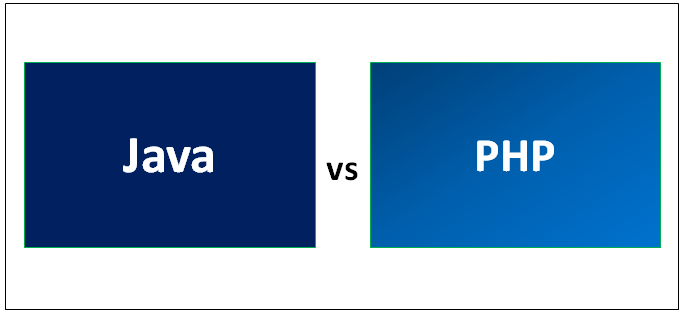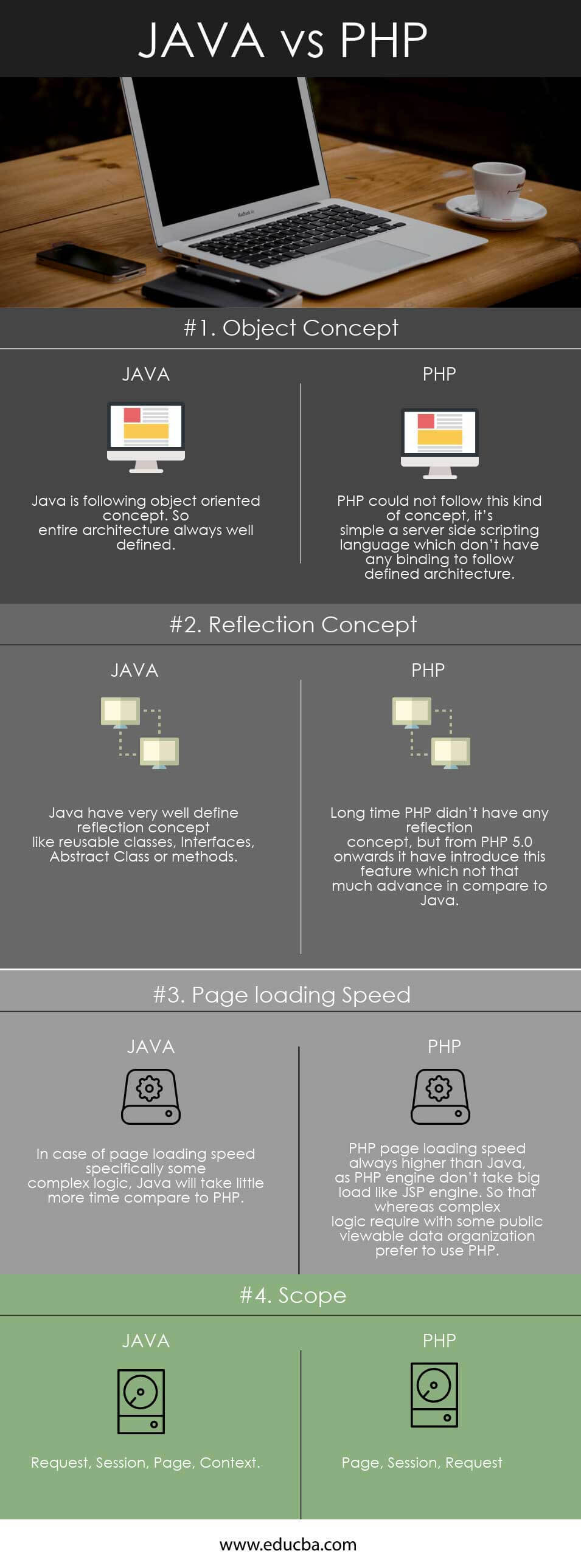Updated May 8, 2023

Differences Between Java vs PHP
Java is a purely general-purpose programming language, and PHP is typically a server-side scripting language. Java can support server-side and client-side language, whereas PHP only supports server-side language. Any Java code must be appropriately compiled before execution, and it’s a strongly typed language. In contrast, PHP is a dynamically typed language where code compilation is not required. Regarding application security and architecture concepts Java is far better than PHP at any point.
Let us study Java and PHP in Detail:
PHP mainly considers server site script programming, which anyone can write; most web hosting companies use Apache server/PHP. Where Java programming can’t be able to write by anyone, a detailed understanding is required to write the code in Java. PHP does not follow any application server concept; it just has one PHP Engine which runs .php files easily. Whereas for Java applications, it should need to deploy any web application server as a WAR or EAR file. JSP engine only displays the page, WAR, or EAR file containing all the required .class files, JAR libraries, or JSP pages.
As the WAR or EAR file typically contains the .class file, it is impossible to read it quickly, verities tools are there to convert from .class to Java, but it did not come in proper code format. Whereas PHP is very easy to read, if anyone tracks the deployment environment, he can easily view PHP files or replace the same. Java also has a servlet filter concept which helps rectify requests or advance user define security, whereas PHP doesn’t have this concept.
Head-to-Head Comparison Between Java vs PHP (Infographics)
Below are the top 4 comparisons between Java vs PHP:
Key Differences Between Java vs PHP
Below is a list of points that explain the key difference between Java vs PHP:
- Java needs an Application Server, JVM, operating system, and a web server to run any application. PHP only needs Apache Server/IIS, PHP Engine, Operating System, and Web Server to run.
- Application security is one of the key points of any Java Application. Servlet filters, URL encoding, and Secure Web Services are mainly used in Java for an application security perspective. At the same time, PHP doesn’t have a concept of this kind of security handling.
- Java is straightforward to communicate with any API, which prefers Java for future automated tool development. Whereas PHP has some restrictions in the concept of API calls, API calling is also possible through PHP in the upper version.
- Java has reflection concepts internally from the first day onwards, like Interface, repetitive classes, Abstract Class, or methods concepts. Whereas PHP doesn’t have this kind of concept, PHP’s advanced version introduces the same, which is not much advance as Java.
- Regarding page loading timing consideration, PHP pages are faster than JSP pages. The number of tasks defined for the PHP engine is much less than for the JSP engine. Still, Java has many performance tuning options; one of the biggest ways to improve page loading performance is not writing any business logic or core Java code inside the JSP pages and typically using a tag library (for example, JSTL) for handling this purpose.
- As PHP is straightforward to learn, it is low cost and resource availability. At the same time, Java maintains a higher cost, obviously, than PHP.
- Several open popular page design tools like Drupal and WordPress have been written in PHP. Java usually is not that popular as a page design tool, whereas Java is mainly famous for those tools concentrating on business logic or Object presentation concept.
- Updating the PHP version is easy; adding ‘Hello Web 2.0’ is enough to correct any PHP page’s version.
- Managing or updating JSP pages is not very tough, but people should have a fundamental knowledge of Java Programming for writing complex logic. Whereas modifying PHP pages is very easy, any designer or HTML developer can do it.
Java vs PHP Comparison Table
Below are the lists of points that describe the comparisons:
| Basis of Comparison | Java | PHP |
| Object Concept | Java follows the object-oriented concept. So entire architecture is always well-defined. | PHP could not follow this concept; it’s simply a server-side scripting language with no binding to follow defined architecture. |
| Reflection Concept | Java has well-defined reflection concepts like reusable classes, Interfaces, Abstract Classes, or methods. | Long time PHP didn’t have any reflection concept, but from PHP 5.0 onwards, it introduced this feature which is not that advanced compared to Java. |
| Page loading Speed | Regarding page loading speed, precisely some complex logic, Java will take a little longer than PHP. | PHP page loading speed is always higher than Java, as the PHP engine doesn’t take a big load like the JSP engine. So that whereas complex logic requires some publicly viewable data, the organization prefers to use PHP. |
| Scope | Request, Session, Page, Context. | Page, Session, Request. |
Conclusion
So concluding all aspects, Java vs PHP follows different approaches in developing and deploying any web application. The leading organization, mainly banking, procurement, or other important domain, always prefers Java due to security constraints and is friendly to use any external or third-party API. Companies mainly use PHP to design normal web screens requiring minimal database access for dynamic views or admin management.
PHP is always a low-cost investment, so it is always preferable for a small organization to start a straightforward web page, which helps them start their initial business. Clouding came into the market, especially AWS, which provides many options to minimize the cost of using the Java platform, attract small or starting organizations, and use the Java platform at minimum cost and give the best services.
Recommended Articles
This has been a guide to Java vs PHP. Here we have discussed Java vs PHP head-to-head comparison, key differences, infographics, and a comparison table. You may also have a look at the following articles to learn more –

